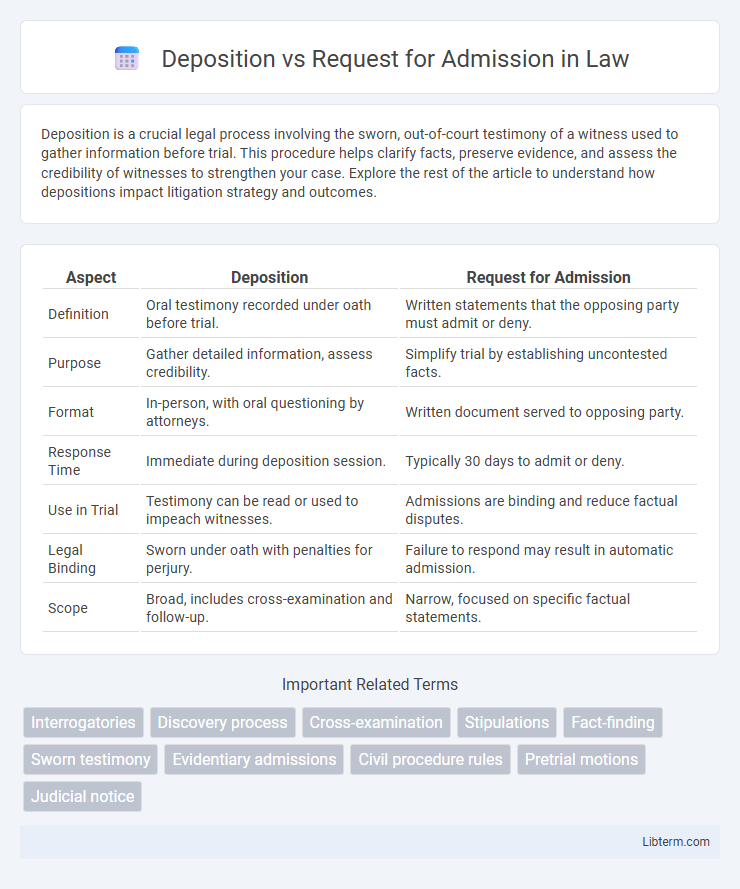Deposition is a crucial legal process involving the sworn, out-of-court testimony of a witness used to gather information before trial. This procedure helps clarify facts, preserve evidence, and assess the credibility of witnesses to strengthen your case. Explore the rest of the article to understand how depositions impact litigation strategy and outcomes.
Table of Comparison
| Aspect | Deposition | Request for Admission |
|---|---|---|
| Definition | Oral testimony recorded under oath before trial. | Written statements that the opposing party must admit or deny. |
| Purpose | Gather detailed information, assess credibility. | Simplify trial by establishing uncontested facts. |
| Format | In-person, with oral questioning by attorneys. | Written document served to opposing party. |
| Response Time | Immediate during deposition session. | Typically 30 days to admit or deny. |
| Use in Trial | Testimony can be read or used to impeach witnesses. | Admissions are binding and reduce factual disputes. |
| Legal Binding | Sworn under oath with penalties for perjury. | Failure to respond may result in automatic admission. |
| Scope | Broad, includes cross-examination and follow-up. | Narrow, focused on specific factual statements. |
Understanding Depositions: Definition and Purpose
Depositions are sworn, out-of-court testimonies used to gather detailed information from witnesses before trial, serving as a critical tool in the discovery phase of litigation. They provide attorneys the opportunity to ask oral questions, record responses under oath, and assess witness credibility. Unlike Requests for Admission, which seek written acknowledgment of facts, depositions allow for dynamic interaction and comprehensive fact-finding.
What is a Request for Admission? Key Concepts
A Request for Admission is a legal tool used in civil litigation to simplify the trial by having one party ask the other to admit the truth of specific facts or the authenticity of documents. This discovery method helps narrow the issues in dispute by eliminating the need to prove facts that are uncontested, thereby saving time and resources. Requests for Admission must be answered within a set deadline, typically 30 days, or the facts are deemed admitted by default.
Main Differences Between Depositions and Requests for Admission
Depositions involve oral testimony recorded under oath, allowing attorneys to ask detailed questions and observe witness demeanor, whereas Requests for Admission consist of written statements that parties must admit or deny to narrow down factual issues. Depositions provide opportunities for immediate follow-up questions and clarification, while Requests for Admission are limited to yes or no answers and help streamline trial preparation by establishing facts upfront. The primary difference lies in the interactive, spontaneous nature of depositions compared to the static, written format of Requests for Admission.
Legal Procedures: Deposition vs Request for Admission
Depositions involve sworn, in-person or virtual questioning of a witness or party under oath, aimed at gathering detailed testimony and evidence for trial preparation. Requests for Admission are written statements sent to an opposing party, requiring them to admit or deny specific facts to narrow issues and streamline trial proceedings. Both tools serve distinct strategic roles in legal discovery, with depositions emphasizing comprehensive factual exploration and admissions targeting uncontested facts to expedite case resolution.
When to Use a Deposition in Litigation
A deposition is used in litigation when detailed, sworn testimony is needed to clarify facts, evaluate witness credibility, or preserve evidence for trial. It is particularly valuable for discovering new information and assessing how witnesses respond under direct questioning. Depositions are preferred when complex issues require in-depth exploration that written requests, like Requests for Admission, cannot provide.
When to Use a Request for Admission in Legal Cases
Requests for Admission are strategically used in legal cases to simplify issues by compelling the opposing party to admit or deny specific facts, thus narrowing the scope of dispute before trial. They are most effective early in discovery when parties seek to establish uncontested facts and reduce the amount of evidence needed at trial. Unlike depositions, Requests for Admission are written and require less time and cost, making them ideal for confirming straightforward facts and streamlining litigation.
Advantages and Limitations of Depositions
Depositions provide the advantage of capturing detailed, real-time testimony under oath, allowing attorneys to observe witness behavior and clarify ambiguous statements, which is crucial for impeachment and trial preparation. However, depositions can be time-consuming and costly, potentially causing witness fatigue or inadvertent disclosure of sensitive information. Their limitation lies in the fact that deposition testimony occurs outside the courtroom, often lacking the formal evidentiary weight unless recorded and properly preserved for trial usage.
Pros and Cons of Requests for Admission
Requests for Admission streamline the litigation process by compelling parties to admit or deny specific facts, reducing the number of contested issues at trial and saving time and resources. However, overly broad or vague requests can lead to strategic evasion, disputes, and motions to compel, increasing litigation costs and delays. Unlike depositions that provide detailed, real-time testimony, Requests for Admission lack the immediacy and richness of oral questioning, limiting their use in uncovering new evidence.
Impact on Case Strategy: Choosing the Right Tool
Depositions provide in-depth, real-time testimony that can reveal witness credibility and uncover new evidence, making them crucial for developing case strategy and preparing for trial. Requests for Admission streamline the process by requiring parties to confirm or deny facts, reducing issues in dispute and focusing resources on contested matters. Selecting between depositions and requests for admission depends on the case complexity, discovery goals, and the desired level of detail to optimize legal strategy.
Tips for Effectively Using Depositions and Requests for Admission
Utilize depositions to gather detailed, firsthand witness testimony, focusing on clear, concise questioning to minimize evasion and preserve key admissions for trial. Craft requests for admission to target specific facts or documents, reducing the scope of disputes and streamlining case preparation by compelling the opposing party to concede uncontested matters. Combine both tools strategically to build a strong evidentiary foundation, enhancing negotiation leverage and improving case management efficiency.
Deposition Infographic

 libterm.com
libterm.com